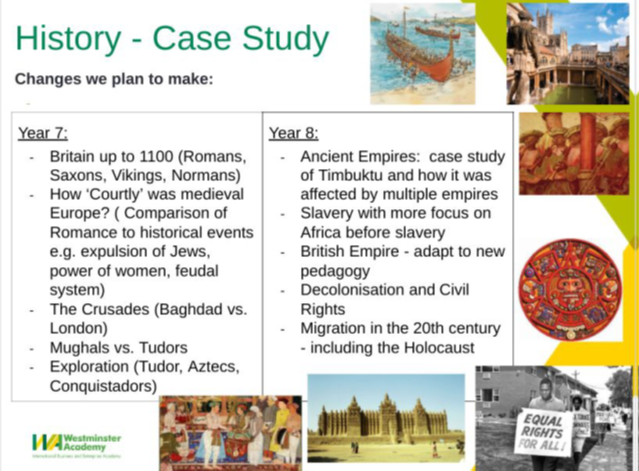
Charlotte Nicholas from Westminster Academy shares her LLP think-piece from 2020 focusing on her school’s journey to create a more diverse curriculum.
The trigger
The tragic death of George Floyd 25th May 2020 undeniably created ripples across the world, the spotlight of media attention was cast on the Black Lives Matter Movement and people became more aware or were unfortunately reminded of the injustices in our current world and the way in which our systems of government and policing fail so many. For a long time I have been disgusted and yet fascinated by the systematic racism that exists in our country and like many, have read popular works like ‘Why I’m no longer talking to white people about race’ by Renni Eddo Lodge and
‘Natives: Race and Class in the Ruins of Empire’ by Akala which are an excellent starting point to educate oneself on these deep issues. My grasp of the full extent of institutionalised racism that exists in our country is still being developed by my own desire to learn and question the status quo. Furthermore, teaching in inner London schools has given me a window into understanding the level of inequality and poverty in the UK. Whilst in the past I had been able to understand and become frustrated by these issues, this was more implicit rather than something I could really grasp, connect all the dots and make decisions about how I might make an impact. This is partially because before the summer of 2020, I’m ashamed to admit, I hadn’t deeply questioned how I got to where I am in life and the undeniable privilege that the combination of my whiteness, social class and education has given me and how all of these factors are so deeply intertwined. Although I was able to see that our system is not fair or right in the way it fails so many, I did not yet have an understanding of the way in which racism is so deeply established in our systems in the UK, what white privilege is, how it disseminates and the level of entrenched implicit bias. Clearly it was time for some more education on my part and some thinking about what I might be able to do even in the very limited remit that I have as one teacher, in one school, in London, England.
I know that I am not alone in the strong feelings I hold about education being a crucial part of our society to achieve equity (not equality!) as well as social cohesion. After the death of George Floyd, I wanted to learn more about Black history, more on organisations that are committed to creating change such as The Black Curriculum (https://theblackcurriculum.com/) and The Runnymede Trust (https://www.runnymedetrust.org) the UK’s leading independent think tank to challenge race inequality in Britain. The widespread media focus on the Black Lives Matter movement during the summer meant that I was exposed to so many articles, blog posts, social media posts that were
inspiring as well as worrying, saddening and shocking. In June 2020 I came across an Instagram post by the Black Curriculum that discussed calls for change in the history National Curriculum.
This made me reflect upon a number of aspects of our role of educators to contribute to and pursue widespread societal change, some of my early reflections are below:
- The National History Curriculum has only one mandatory topic, the Holocaust. In order for teachers to teach Black British history, the curriculum relies on teachers having the knowledge, confidence and desire for Black history to be taught in light of the latest historiographical approaches and findings and teachers placing importance on voices and experiences of Black individuals. The National Curriculum is open to interpretation and this in itself is hugely problematic.
- The history curriculum within our school in Year 7 focused on the white-washed British History of the Battle of Hastings, Black Death and Tudors which had a complete lack of any non-white history. Year 8 did learn about the Transatlantic Slave Trade, the British Empire and an extreme light touch on Civil Rights in the US (which was wrongly conflated with the abolition of slavery in the UK) and minor emphasis on migration in the 20th century, including the Windrush Scandal. Although we were trying in this area, it was flawed and needed some fresh planning, insight and research.
- The AQA History GCSE specification: our choices of Health Through Time, Elizabeth I, The Cold War and Germany were entirely lacking any diversity. It is deeply concerning that the Health Through Time specification is mostly devoid of the work of anyone other than white men, but this perhaps shedding light on the deeper problem of the History GCSE specifications as a whole.
After this thinking, it became clear that as an individual teacher and as a school we just were not doing enough in order to achieve social justice through education and it was time for some change.
Early reflections
After some extremely passionate, honest and thought provoking conversations via WhatsApp with a Vice Principal (henceforth JC) of my school, some of the key areas that needed changing within our school regarding teaching and learning were:
- The limited presence of Black stories, voices, experiences and traces in our school curriculum.
- Our school’s approach to Black History Month.
- The way in which we teach slavery and empire to key stage three – this needed more reaction to the latest reports and research from organisations such as The Runnymede Trust , The Black Curriculum and RIDE
(https://www.runnymedetrust.org/projects-and-publications/education/runnymede-tide-project-teaching-migration-report.html) and historians offering new works on Black history. - Staff’s education and professional development on how to develop our curriculum and other aspects of school life to engrain all of the above.
- Staff collaboration which focuses on the need for change and how we can implement our desires for change.
These conversations also led to a discussion about the way in which the Holocaust Centre for Education completed an extensive study (https://www.holocausteducation.org.uk/) into how the Holocaust should be taught which focused around the points of what teachers think and worry about in their teaching of the Holocaust as well as what children think and their misconceptions. The extensive study created by the Holocaust Centre for Education then created some guiding principles that today form the basis of Holocaust education in our school as well as in schools across the UK. Whilst the experiences of Jews in the Holocaust and experiences of Black individuals in the events of Empire, Transatlantic Slavery, Migration etc. are not the same, I wondered whether something this extensive had been created for education about Black History and if not, why? This question has also been asked by the Runnymede Trust. Their campaigns regarding Black History education have drawn parallels between the way in which Holocaust education has received funding, research and comprehensive reports to guide educators into how it should be taught. They are working to compel the British government to create similar studies into Black British history focusing on:
- Why should we teach this?
- What should we teach?
- How should we teach this?
Influenced by The Runnymede Trust and using their template of letters to MPs attempting to get change in the History curriculum, I wrote to my local MP in Wandsworth, which seems like a small drop in the ocean. I was passionate about pursuing change within our school, as educators we have such a unique power in our ability to make change and this is something I felt we needed to fully take advantage of. I’m extremely grateful that at this point, JC encouraged me to reach out to the Assistant Vice Principal for Teaching and Learning (henceforth DB). At the start of June, I outlined to her how I had been thinking a lot about our curriculum and how organisations like The Black Curriculum and Runnymede Trust are calling for change in education. I explained that I thought that it was not just in our history curriculum that change was needed but in our wider school curriculum. I requested a meeting with her in order to focus on how we might engrain Black lives in our teaching and learning. This is where things really started to be set into motion and it is at this point that I must mention how it was time to accept the limitations of my role as a history teacher in being able to implement school wide change, I was exceedingly happy to partner with a member of our SLT. DB had formerly been our Head of English and outlined her desire for change within that area of the curriculum, commenting on the lack of non-white authors in the curriculum and for change in the curriculum as a whole. Before the SLT meeting that week, DB and myself discussed our ideas for what we wanted in our school, what our focus should be and the scope of what we wanted to do as well as the avenues we might pursue. On a zoom call we came up with the following ideas:
- A staff BLM focus group which would focus on thinking over the entire school curriculum, seeing where we are at in terms of diversity and areas of improvement.
- The creation of a charter of commitments we would make to teaching and learning in the next academic year and beyond.
- Pursuit of specialised training.
- The devotion of a whole school Enrichment day to Black History Month for all Year groups.
The Principal and Senior Leadership team were incredibly supportive and agreed that this change needed to happen, we were given the go ahead. As this would now be a whole school agenda, DB took the lead and reached out to all staff and asked for volunteers for a staff focus group. This group would meet in the last few weeks of the summer term roughly twice a week to ensure that a charter and commitments were made before the holidays for the next academic year. DB and myself were blown away by the thirty one staff, teaching and non-teaching that wanted to be involved, I consider myself so lucky that I work in a school of dedicated individuals that are so passionate about collaborating to create change and recognising its importance.
The Focus Group and the BLM Charter
DB and I worked together in planning what we would discuss during the focus group meetings and one of the things we thought would be interesting to do would be to model our charter around the Holocaust Education principles of the why? what? and how? In the first focus group meeting on the 17th June, I explained the principles from the Holocaust Centre for Education with some thoughts on how we might apply this to the integration of Black history and experiences. We created a Padlet after this first meeting for staff to voice any concerns they might have about the focus group itself or the charter. Some of the ideas and concerns that were raised are shown in Appendix A.
Over the course of a few short weeks the focus group meetings took place over zoom, our virtual meeting became a place of collaboration, thinking and open discussions about ways in which as a school community we could improve and ideas for our charter. The contributions in these focus groups were extremely valuable and showed how on-board staff were in creating change. Whilst DB and myself are passionate about large scale societal change and the role school plays in this, it was at this point that DB and myself realised that we needed to set ourselves a narrow focus as a first step and decided that we should focus solely on teaching and learning. Although we didn’t want to dampen the importance of other issues in society and how these filter down to schools, we thought it incredibly important that teaching and learning should be our first step. We discussed this with the focus group in later meetings and decided upon an action plan for some next steps.
Action plan July 2020
Immediate actions:
- The publication of our charter (please see Appendix C )
- Organise a staff session on September inset to discuss charter and plans.
- Educate ourselves on new pedagogy / guidance / examples of how BLM has been ingrained in your subject and use this to reflect on and make changes in your own practice.
- Consult with an outside organisation to arrange whole staff training.
- Ensure better representation of Black individuals in lessons and in tutor time presentations.
- Create a student voice survey about the current education they receive about Black history and experience to gauge where we are. (please see Appendix B).
- Department meeting time given in early July to consider Black representation in all curriculum areas.
Short-term actions:
- Review assemblies for 2020/1
- Review bullying and behaviour policy.
- Create a curriculum map of Black representation.
- Audit of curriculum- Heads of departments to create curriculum audits to hold teachers to account to make changes in subjects.
- Enrichment Day October 2020 to be solely focused on Black History Month.
Long-term actions:
- Continued whole staff training.
- Engagement with stakeholders, governors and business links.
- Create other focus groups where other aspects of school life; leadership, student experience, pressure to exam boards, government, governing bodies etc are explored.
A crucial issue that a member of our focus group raised was the need for student voice to help us understand what our students feel like they learn in school, what they would like to learn and whether or not they were comfortable discussing ‘race’ in school. Please see a selection of questions and responses in Appendix B. This was vital for us to learn about what our students felt and what they wanted to see in their curriculum.
Implementation
Training:
During the September inset day; DB, myself and the head of history (henceforth CMT) led a session titled ‘Doing Justice to Diversity’ where we outlined the charter and aspects of the action plan to the whole school staff. We explained that the focus for the year would be to make changes in our curriculum and receive training from an outside body to develop our understanding and teaching.
Whole staff training is key, whilst we are able to change the curriculum, as educators it is important that we are actively anti-racist and we need specific and expert training on how to achieve this. We are very lucky to have started collaborating with The Prosperity Project (https://www.tprosperityproject.com/who-we-are), an organisation which was created to tackle difficult conversations about race and help develop teachers and schools on how to effectively be anti-racist. In their independent study, they found that 70% of schools believe that they would benefit from training around race-related issues. DB and I had our first consultation with them in early July. The suitability of The Prosperity Project in providing our whole school training was palpable from our first consultation with their founder Michaela. It was explained to us that they offer core content which is delivered to all schools they work with which includes an introduction to racism in schools / the workplace and implicit bias. In addition to this they offer optional modules that are to be selected based on the specific requirements in the school. Being a trained teacher herself, Michaela understood perfectly where our school was at and could help diagnose our needs as a school. We are going to receive our initial training in January which will involve the whole school staff and I am keenly anticipating the content to be delivered, the important conversations we will have as a staff body and the impact that it will have on us and our pupils.
History curriculum
After asking departments across the school to reflect on their subject areas and consider how they might diversify their curriculums it was important that changes were made in my own subject area. The seemingly most obvious place to start ingraining Black history is within the school history curriculum. I am incredibly lucky that I have a supportive head of history, CMT, that is as passionate about making changes to the history curriculum as I am and who also wanted to breathe new life into our history lessons that are more in line with the latest historiographical debates, archive material and developments from independent think tanks. Not only do we think that these changes are important to enrich our students’ learning but we firmly believe that studying history like this will make them better historians and thinkers overall, setting them up better for future life. I mentioned previously about the subjects that we had previously studied in Key Stage 3 and 4 under former leadership. Appendix D shows an outline of the changes we intend to make and have
started implementing from September 2020.
Our rationale for changes within the history curriculum were:
In Year 7:
- Study of invasions / settlers means that students have a deeper understanding of empire and immigration. Necessary to include the migration of Black Romans to Britain.
- Medieval world not just based on Britain – Lens into the Islamic Empire and India.
- Global view of the world vs Eurocentric
In Year 8:
- Needed a revamp to be in line with new pedagogical advancements in Black British history.
- Understand the complexity of empire and migration, how they are interlinked and how they form the multicultural society we live in today.
Whilst the GCSE specifications unfortunately bind us to certain topics, individuals and events, it is still possible to weave in Black History through the current specification. For instance whilst learning about Elizabeth I it is important that we include a include the most recent literature by Miranda Kaufman on Black Tudors, whilst at this stage the history of Black peoples will be much more woven in rather than taught as an entire topic, it is vital that students understand the historical truth, that Black people have been in Britain since Anglo-Saxon times and to deny this is a folly. When learning about Germany from 1895-1945 it is also possible to consider the experience of Black Jews in the Holocaust, to oversimplify history into only considering white Jews is also counterfactual. As mentioned previously, the Health Through Time Module is lacking in diversity full stop. Florence Nightingale is not even mentioned on the specification and whilst I do not claim to over exaggerate her role in the development of medicine, to exclude her in the story of British Health of 1000 years is utterly ridiculous. There are many other women that are missing, not to mention the complete exclusion of Black history in this area. When I attended a webinar with AQA in the summer holidays that was focused on the implications of the COVID-19 pandemic on the 2021 examination series, naturally, in light of the media spotlight on the Black Lives Matter Movement, I typed into the chat box a question (as did others) about whether changes would be made to diversify the GCSE specifications. It was suggested that the specification does not bind teachers to certain topics and that teachers are free to go off the specification, this sounds familiar doesn’t it? This is all part of the issues of the systematic denial of the importance of the place of Black history within our institutions, from the government, all the way to the exam boards which are tasked with creating appropriate testing for our children. Whilst I am incredibly fortunate that I am in a history department that is seeking to teach to the most current, up to date pedagogy and debates amongst historians, others around the country are not. I am not trying to claim here that teachers that don’t weave more Black History into their schemes of work are doing this on purpose, there are all sorts of reasons for limitations in our schemes of work but similar to issues with the National Curriculum, in my opinion, change must come from above. The nature of history as a subject means that a lot of thought goes into the selection of topics in Key Stage 3 and 4. Our new choice of topics may not be perfect but they are a move towards better inclusivity and diversity in our history teaching which not only focuses on Black history but history of groups and individuals from different intersections. Planning this new content has been greatly rewarding and helped build my own knowledge of these histories, I am certain it will have a great impact on our students.
Black History Month 2020
In previous years at school, we had in no way been doing enough to celebrate Black History Month, this is something that for several years I have wanted to change, this has been furthered by students in my history classes asking me ‘Miss, why don’t we do anything for Black History Month’ and I was never able to give them a legitimate answer. As part of the action plan and focus group, DB and I knew that it was incredibly important to do more to celebrate Black History Month 2020. This started with DB leading a whole curriculum audit of the content that is taught in all subject areas in October where department teams were urged to commit themselves to teaching content that would incorporate Black history, experiences, voices and cultures. As part of this they were also asked to contribute to ideas for the annual October enrichment day where the whole school focus would be on Black History Month. It was overwhelming to see some of the changes that were made, some of which included:
- Non-fiction articles by Black authors in English.
- Mathematical questions where the answer was an important date in Black history.
- Black scientists in the NASA space programme in Science.
- Research project on Black scientists who contributed to the fields of energy, chemical bonding and electrolysis in Science.
- A study into the role of science in oppressing Black people throughout history looking into how ‘race science’ was used to justify atrocities in Science.
- Focus on language with consideration of questions such as ‘can language be racist?’ looking at how racist ideas are built into language in Modern Foreign Languages.
- Exploring megacities such as Lagos and Kinshasa and the opportunities and challenges in urban areas in Geography.
- The Mali Empire and its successes as well as The Civil Rights Movement in the US in History.
- Exploration of different styles of music with a focus on Black musicians and composers in Music.
- Discrimination through the study of Noughts and Crosses by Malorie Blackman. Monologues focusing on cultural perspective. Cultural representation through the creation of characters in Drama.
- Caribbean and African recipes to help create an awareness of culture and identity. Ongoing investigation into student’s home cultures and traditions around food and recipe in Food.
- Focus on the Alvin Ailey American Dance Theatre and South African Gumboot dance.
This is by no means the full extent of the changes that were made but is testament to how much teachers were committed to change within our curriculum and highlights that when a focus is made a priority across the school, significant change can be made. In addition to the changes that were made in the curriculum, for the entirety of October we had a poster on every classroom door in the school with important Black figures purchased from https://www.blackhistorymonth.org.uk/ in addition to a display in the library.
Another feature of October was our Black History Month enrichment day. Students have three enrichment days in the year where they are off timetable and focus on enriching topics and activities that are outside of the curriculum. This was a great opportunity for departments to become creative in how they could incorporate Black lives into a day of learning. Some of activities are listed below:
- Monopoly challenge which include monuments, areas and buildings of consequence to Black history.
- African fables, folklore and oral storytelling traditions.
- ‘What does a scientist look like?’ Focus on challenging the stereotype of scientists being predominantly white, European males.
- Focus on Notting Hill Carnival and addressing the issues surrounding some monuments in London.
- Support of the #BlackPoundMovement where students create adverts for local Black
It was fantastic to have a whole day purely focusing on Black history, culture and experience. After the enrichment day we thought it important to see what students felt about the day they had experienced. From reading the student comments, the day was well received but it is clear that there is still more to be done. I hope all the hard work that has gone into the curriculum changes across the school continue and the emphasis on Black history month remains.
Final Reflections
I am overwhelmed and incredibly proud of how far we have come and the progress as a school we have made in such a short period of time. Nonetheless this journey is not over and we still need to continue to reflect on our curriculum to incorporate Black lives as well as the lives of others from other intersections who have been marginalised and overlooked who need to be celebrated. It is also crucial that the approach we are now taking has longevity and is something that becomes part of the culture of our school rather than something that can be attached to some staff members whilst they are part of the community. The focus groups continue to discuss issues and long may this continue. It is clear that expert training will continue to be incredibly important in our journey as well as more collaboration with other organisations and schools to ensure that we keep moving forward. It is vital that teachers reflect on the level of diversity in their school curricula and if they are not doing enough to incorporate the stories, experiences, history and culture of Black individuals, action is needed.
Appendices
Appendix A: Focus group contributions about concerns surrounding trying to bring BLM more ingrained into our teaching and learning.
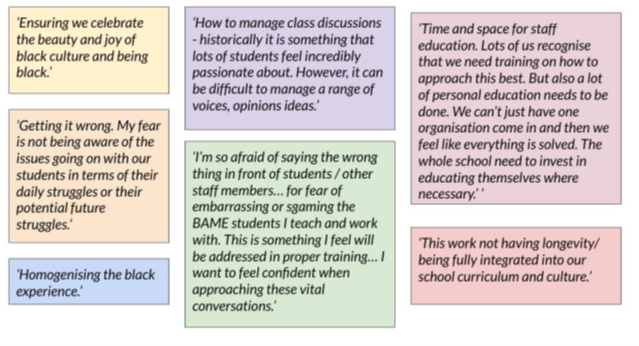
Appendix B: A selection of student survey questions and their responses.
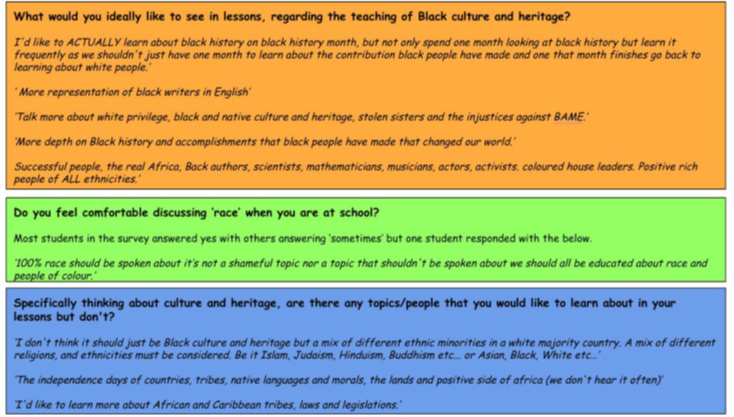
Appendix C: Black Lives Matter Teaching and Learning Charter
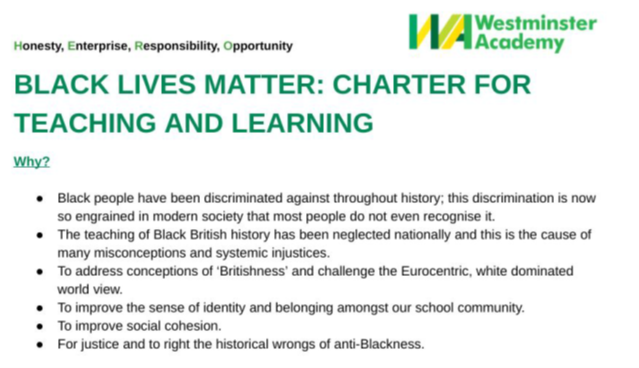
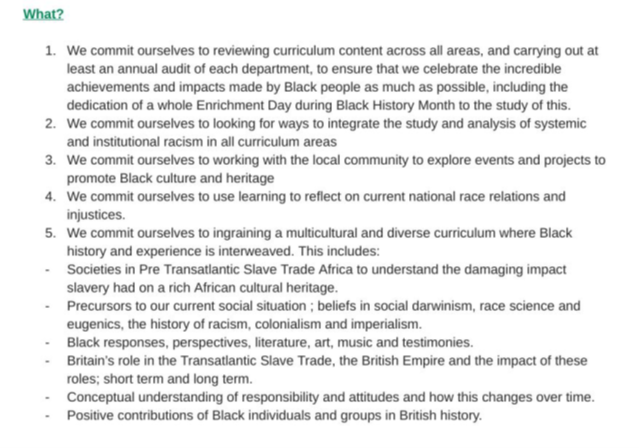
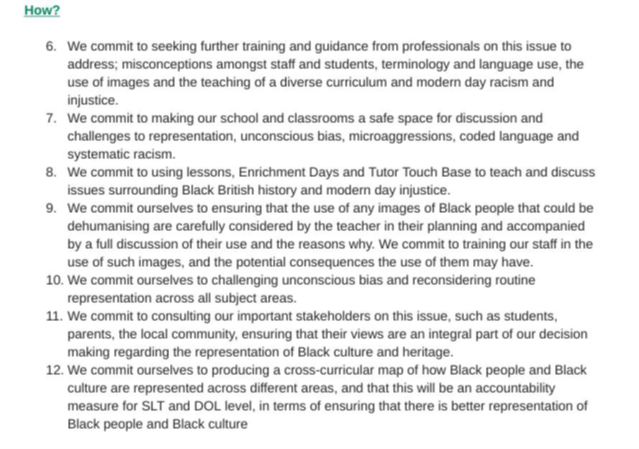
Appendix D: Planned changes to the History Curriculum for the 2020-1 Academic Year
